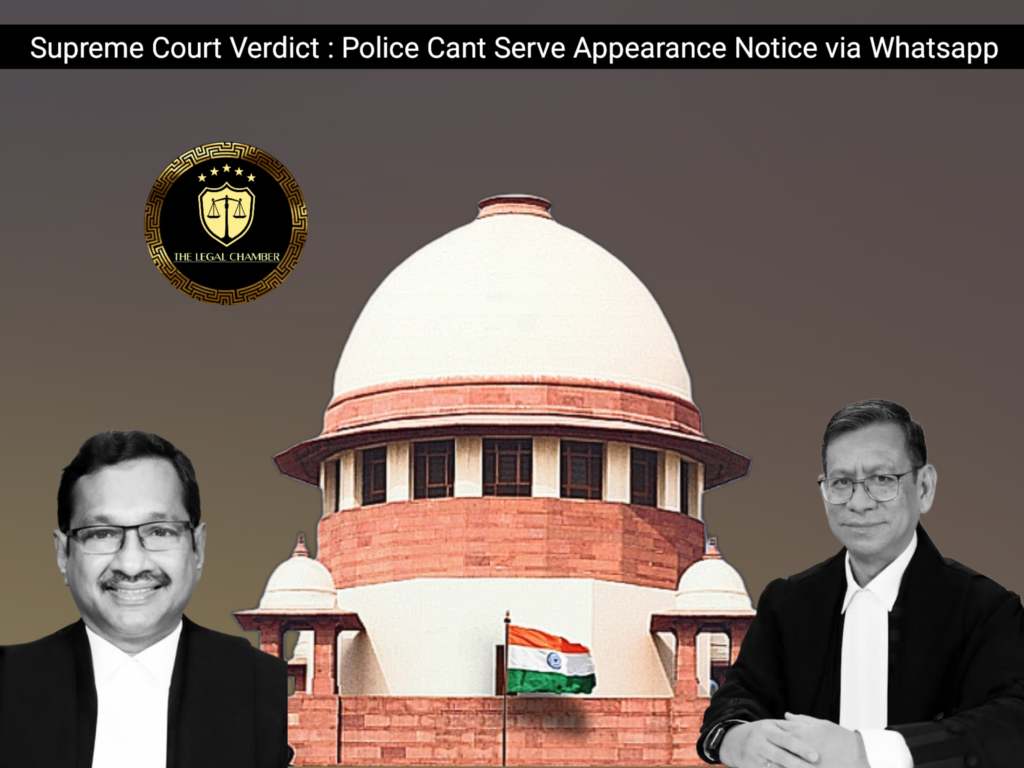
The Supreme Court dismissed the application seeking modification of its earlier order, holding that electronic communication (e.g., WhatsApp) is not a valid mode for serving notices under Section 35 of the Bharatiya Nagarik Suraksha Sanhita (BNSS), 2023. The Court emphasized that such notices, which impact personal liberty, must adhere strictly to prescribed modes of service under the BNSS. It clarified that while electronic service is permissible for court summons under Sections 63, 64, and 71 of the BNSS, the same cannot be extended to investigative notices under Section 35, as the legislative intent excludes electronic modes for this purpose. The judgment underscores the importance of safeguarding individual liberty under Article 21 of the Constitution.
Facts Of The Case:
The case arose from an application (IA No. 63691 of 2025) filed by the State of Haryana seeking modification of the Supreme Court’s order dated 21.01.2025, which directed all states and union territories to issue standing orders mandating that notices under Section 41-A of the CrPC, 1973 (now Section 35 of the BNSS, 2023) be served only through prescribed modes under the law, excluding electronic communication like WhatsApp. The State argued that electronic service was efficient and permitted under other provisions of the BNSS, such as Sections 64(2) and 71, which allow electronic summons. The Amicus Curiae countered that electronic service of Section 35 notices was impermissible, as non-compliance could lead to arrest, impacting personal liberty under Article 21. The Court examined the legislative intent behind the BNSS and held that while electronic communication was allowed for court summons (Sections 63, 64, and 71) and certain investigative procedures (Sections 94 and 193), it was deliberately excluded for Section 35 notices due to their direct consequences on liberty. The Court upheld its earlier order, dismissing the application and reaffirming that investigative notices must be served personally to ensure due process.
Procedural History:
The procedural history of the case begins with the Supreme Court’s earlier order dated 21.01.2025 in MA No. 2034/2022 (arising from MA No. 1849/2021 in SLP (Crl.) No. 5191/2021), where the Court directed all states and union territories to issue standing orders mandating that notices under Section 41-A CrPC (now Section 35 BNSS, 2023) be served strictly through prescribed modes, excluding electronic communication like WhatsApp. Subsequently, the State of Haryana filed IA No. 63691 of 2025, seeking modification of this order, arguing that electronic service was permissible under the BNSS. The matter was heard by a two-judge bench (Justices M.M. Sundresh and Nongmeikapam Kotiswar Singh), which examined the legislative intent behind the BNSS and the distinction between judicial summons and investigative notices. After considering submissions from both the State and the Amicus Curiae, the Supreme Court dismissed the application on 16.07.2025, upholding its earlier order and reaffirming that Section 35 notices must be served in person to safeguard personal liberty under Article 21. The judgment thus settled the legal position on the permissible modes of service under the BNSS.
READ ALSO:Supreme Court Clarifies When Electricity Contracts Beat Regulatory Caps
Court Observation:
The Supreme Court made several key observations in its judgment. It emphasized that Section 35 of the BNSS, 2023, which governs notices for appearance before investigating agencies, must strictly adhere to prescribed modes of service, excluding electronic communication like WhatsApp. The Court noted that while Sections 63, 64, and 71 of the BNSS permit electronic service of court summons, the same cannot be extended to investigative notices under Section 35, as non-compliance with such notices could lead to arrest—directly impacting personal liberty under Article 21 of the Constitution.The Court highlighted the legislative intent behind the BNSS, observing that Section 530 explicitly allows electronic modes for trials, inquiries, and judicial proceedings but deliberately excludes investigations. It distinguished between judicial summons (court-issued) and investigative notices (police-issued), clarifying that the latter, being an executive act with immediate consequences on liberty, requires stricter procedural safeguards. The Bench also noted that while Sections 94 and 193 of the BNSS permit electronic communication for certain investigative steps (like submitting reports), these do not involve deprivation of liberty.Ultimately, the Court ruled that introducing electronic service for Section 35 notices would contravene legislative intent and undermine due process, reaffirming that personal service remains mandatory to protect fundamental rights. The dismissal of the modification application reinforced the principle that procedural safeguards in criminal law cannot be diluted for convenience
Final Decision & Judgement:
The Supreme Court dismissed the application (IA No. 63691 of 2025) filed by the State of Haryana, upholding its earlier order dated 21.01.2025, which mandated that notices under Section 35 of the BNSS, 2023 (equivalent to Section 41-A CrPC) must be served only through prescribed modes under the law, excluding electronic communication such as WhatsApp. The Court rejected the State’s argument that electronic service should be permitted, emphasizing that investigative notices under Section 35 carry serious implications for personal liberty, unlike court summons under Sections 63, 64, and 71 of the BNSS, where electronic service is explicitly allowed. The Bench, comprising Justices M.M. Sundresh and Nongmeikapam Kotiswar Singh, reinforced that legislative intent under the BNSS deliberately excluded electronic service for Section 35 notices to ensure due process and safeguard fundamental rights under Article 21. The judgment clarified that while technology can streamline judicial processes, it cannot override procedural safeguards in criminal investigations where liberty is at stake. The Court’s decision affirmed strict compliance with traditional service methods for investigative notices, ensuring that no dilution of constitutional protections occurs for the sake of administrative convenience. The order dated 16.07.2025 stands as a binding precedent on the interpretation of service requirements under the BNSS.
Case Details:
Case Title:Satender Kumar Antil v. Central Bureau of Investigation & Anr. Citation:2025 INSC 909 Special Leave Petition (Crl.) No. 5191 of 2021 Date of Judgment:16 July 2025 Bench:Justice M.M. Sundresh & Justice Nongmeikapam Kotiswar Singh
Download The Judgement Here